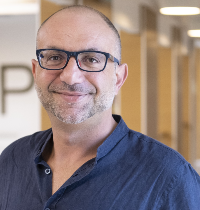
Gerardo Puopolo
 Coordinator
Coordinator
Doctoral Program in Agrifood and Environmental Sciences (D.M.45/2013)
 Associate professor
Associate professor
Center Agriculture Food Environment - C3A
|
|
Education |
|
- Since October 2019: Associate Professor at University of Trento
|
|
|
|
Research interests |
|
His major interests are in the field of Plant Pathology and Applied Microbiology as:
|
|
|
|
Research work |
|
To make more sustainable the control of plant pathogens in agriculture through the development of eco-friendly strategies is the main aim of the research activity. At the same time, the development of eco-friendly strategies will make up to the withdrawal of chemical fungicides from the market (i.e. copper) in the future. Thus, the research activity is focused on the selection, identification, and biochemical and molecular characterization of bacterial strains (Bacillus, Lysobacter, Pseudomonas) and fungal isolates (Ampelomyces, Trichoderma) able to control plant pathogens. The main works are aimed at dissecting molecular mechanisms involved in the control of plant pathogens through metabolomics, genomics, and transcriptomics. Emphasis is also given to the multiple interactions (plant-microbe, microbe-microbe) that may occur in the agro-ecosystems to make the application of bacterial biocontrol agents more reliable. In particular, studies allowed to provide more information on the physiology and ecology of the bacterial genus Lysobacter. |
|
|
|
Memberships in societies and scientific committees |
|
- Member of the Italian Phytopathological Society (S.I.Pa.V.) - Member of IOBC-WRPS International Organisation for Biological Control and integrated pest management |
|
|
|
Conferences and lectures |
|
|
|
|
|
Other work |
|
- Decrypting the role of bacterial signals in microbial interactions to enhance Lysobacter establishment in the rhizosphere – Rhizotalk H2020- Marie Sklodowska-Curie Individual Fellowship (MSCA-IF-2017) - From microbial interactions to new-concept biopesticides and biofertilizers - H2020 Marie Sklodowska-Curie Innovative Training Network (MSCA-ITN-EID) - INTERFUTURE - Replacement of contentious inputs in organic farming systems - H2020 Research and Innovation Programme - RELACS. |


